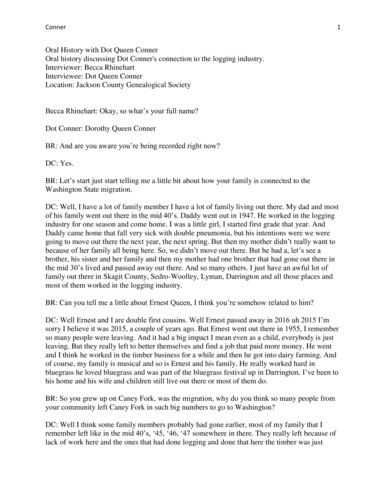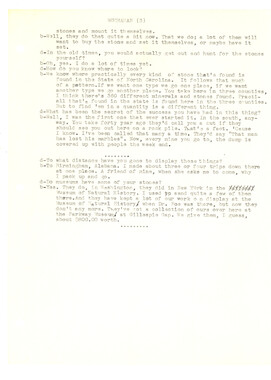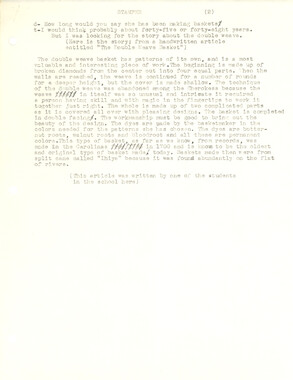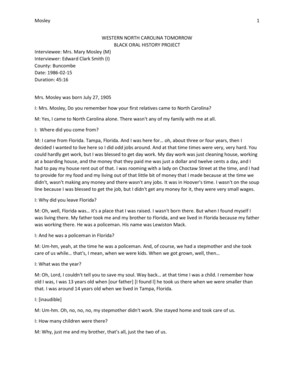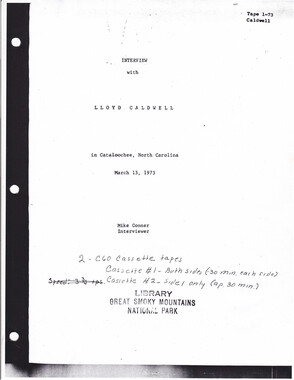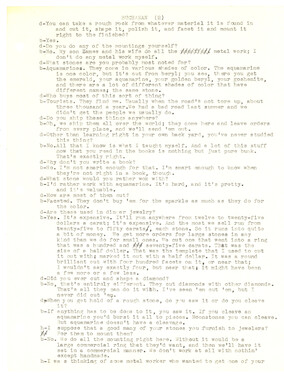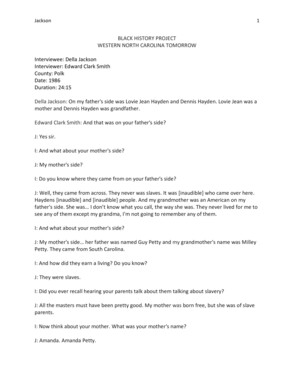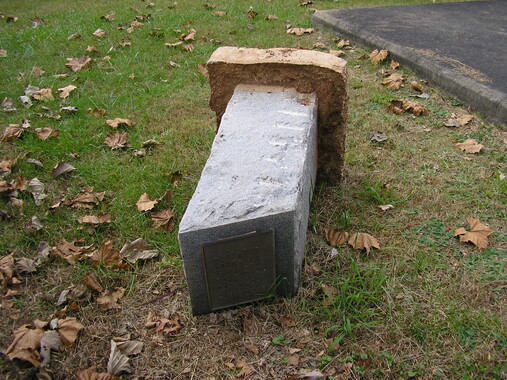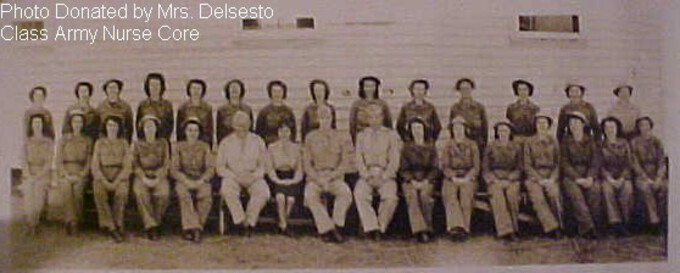Western Carolina University (20)
View all
- Canton Champion Fibre Company (2308)
- Cherokee Traditions (293)
- Civil War in Southern Appalachia (165)
- Craft Revival (1942)
- Great Smoky Mountains - A Park for America (2767)
- Highlights from Western Carolina University (430)
- Horace Kephart (941)
- Journeys Through Jackson (154)
- LGBTQIA+ Archive of Jackson County (19)
- Oral Histories of Western North Carolina (314)
- Picturing Appalachia (6679)
- Stories of Mountain Folk (413)
- Travel Western North Carolina (160)
- Western Carolina University Fine Art Museum Vitreograph Collection (129)
- Western Carolina University Herbarium (92)
- Western Carolina University: Making Memories (708)
- Western Carolina University Publications (2283)
- Western Carolina University Restricted Electronic Theses and Dissertations (146)
- Western North Carolina Regional Maps (71)
- World War II in Southern Appalachia (131)
University of North Carolina Asheville (6)
View all
- 1700s (1)
- 1860s (1)
- 1890s (1)
- 1900s (2)
- 1920s (2)
- 1930s (5)
- 1940s (12)
- 1950s (19)
- 1960s (35)
- 1970s (31)
- 1980s (16)
- 1990s (10)
- 2000s (20)
- 2010s (24)
- 2020s (4)
- 1600s (0)
- 1800s (0)
- 1810s (0)
- 1820s (0)
- 1830s (0)
- 1840s (0)
- 1850s (0)
- 1870s (0)
- 1880s (0)
- 1910s (0)
- Appalachian Region, Southern (15)
- Asheville (N.C.) (11)
- Avery County (N.C.) (1)
- Buncombe County (N.C.) (55)
- Cherokee County (N.C.) (17)
- Clay County (N.C.) (2)
- Graham County (N.C.) (15)
- Great Smoky Mountains National Park (N.C. and Tenn.) (1)
- Haywood County (N.C.) (40)
- Henderson County (N.C.) (5)
- Jackson County (N.C.) (131)
- Knox County (Tenn.) (1)
- Macon County (N.C.) (17)
- Madison County (N.C.) (4)
- McDowell County (N.C.) (1)
- Mitchell County (N.C.) (5)
- Polk County (N.C.) (3)
- Qualla Boundary (6)
- Rutherford County (N.C.) (1)
- Swain County (N.C.) (30)
- Watauga County (N.C.) (2)
- Waynesville (N.C.) (1)
- Yancey County (N.C.) (3)
- Blount County (Tenn.) (0)
- Knoxville (Tenn.) (0)
- Lake Santeetlah (N.C.) (0)
- Transylvania County (N.C.) (0)
- Interviews (314)
- Manuscripts (documents) (3)
- Personal Narratives (7)
- Photographs (4)
- Sound Recordings (308)
- Transcripts (216)
- Aerial Photographs (0)
- Aerial Views (0)
- Albums (books) (0)
- Articles (0)
- Artifacts (object Genre) (0)
- Biography (general Genre) (0)
- Cards (information Artifacts) (0)
- Clippings (information Artifacts) (0)
- Crafts (art Genres) (0)
- Depictions (visual Works) (0)
- Design Drawings (0)
- Drawings (visual Works) (0)
- Envelopes (0)
- Facsimiles (reproductions) (0)
- Fiction (general Genre) (0)
- Financial Records (0)
- Fliers (printed Matter) (0)
- Glass Plate Negatives (0)
- Guidebooks (0)
- Internegatives (0)
- Land Surveys (0)
- Letters (correspondence) (0)
- Maps (documents) (0)
- Memorandums (0)
- Minutes (administrative Records) (0)
- Negatives (photographs) (0)
- Newsletters (0)
- Newspapers (0)
- Occupation Currency (0)
- Paintings (visual Works) (0)
- Pen And Ink Drawings (0)
- Periodicals (0)
- Plans (maps) (0)
- Poetry (0)
- Portraits (0)
- Postcards (0)
- Programs (documents) (0)
- Publications (documents) (0)
- Questionnaires (0)
- Scrapbooks (0)
- Sheet Music (0)
- Slides (photographs) (0)
- Specimens (0)
- Speeches (documents) (0)
- Text Messages (0)
- Tintypes (photographs) (0)
- Video Recordings (physical Artifacts) (0)
- Vitreographs (0)
- WCU Mountain Heritage Center Oral Histories (25)
- WCU Oral History Collection - Mountain People, Mountain Lives (71)
- Western North Carolina Tomorrow Black Oral History Project (69)
- A.L. Ensley Collection (0)
- Appalachian Industrial School Records (0)
- Appalachian National Park Association Records (0)
- Axley-Meroney Collection (0)
- Bayard Wootten Photograph Collection (0)
- Bethel Rural Community Organization Collection (0)
- Blumer Collection (0)
- C.W. Slagle Collection (0)
- Canton Area Historical Museum (0)
- Carlos C. Campbell Collection (0)
- Cataloochee History Project (0)
- Cherokee Studies Collection (0)
- Daisy Dame Photograph Album (0)
- Daniel Boone VI Collection (0)
- Doris Ulmann Photograph Collection (0)
- Elizabeth H. Lasley Collection (0)
- Elizabeth Woolworth Szold Fleharty Collection (0)
- Frank Fry Collection (0)
- George Masa Collection (0)
- Gideon Laney Collection (0)
- Hazel Scarborough Collection (0)
- Hiram C. Wilburn Papers (0)
- Historic Photographs Collection (0)
- Horace Kephart Collection (0)
- Humbard Collection (0)
- Hunter and Weaver Families Collection (0)
- I. D. Blumenthal Collection (0)
- Isadora Williams Collection (0)
- Jesse Bryson Stalcup Collection (0)
- Jim Thompson Collection (0)
- John B. Battle Collection (0)
- John C. Campbell Folk School Records (0)
- John Parris Collection (0)
- Judaculla Rock project (0)
- Kelly Bennett Collection (0)
- Love Family Papers (0)
- Major Wiley Parris Civil War Letters (0)
- Map Collection (0)
- McFee-Misemer Civil War Letters (0)
- Mountain Heritage Center Collection (0)
- Norburn - Robertson - Thomson Families Collection (0)
- Pauline Hood Collection (0)
- Pre-Guild Collection (0)
- Qualla Arts and Crafts Mutual Collection (0)
- R.A. Romanes Collection (0)
- Rosser H. Taylor Collection (0)
- Samuel Robert Owens Collection (0)
- Sara Madison Collection (0)
- Sherrill Studio Photo Collection (0)
- Smoky Mountains Hiking Club Collection (0)
- Stories of Mountain Folk - Radio Programs (0)
- The Reporter, Western Carolina University (0)
- Venoy and Elizabeth Reed Collection (0)
- WCU Gender and Sexuality Oral History Project (0)
- WCU Students Newspapers Collection (0)
- William Williams Stringfield Collection (0)
- Zebulon Weaver Collection (0)
- African Americans (97)
- Artisans (5)
- Cherokee pottery (1)
- Cherokee women (1)
- College student newspapers and periodicals (4)
- Education (3)
- Floods (13)
- Folk music (3)
- Great Smoky Mountains National Park (N.C. and Tenn.) (1)
- Hunting (1)
- Mines and mineral resources (2)
- Rural electrification -- North Carolina, Western (2)
- School integration -- Southern States (2)
- Segregation -- North Carolina, Western (5)
- Slavery (5)
- Sports (2)
- Storytelling (3)
- World War, 1939-1945 (3)
- Appalachian Trail (0)
- Cherokee art (0)
- Cherokee artists -- North Carolina (0)
- Cherokee language (0)
- Church buildings (0)
- Civilian Conservation Corps (U.S.) (0)
- Dams (0)
- Dance (0)
- Forced removal, 1813-1903 (0)
- Forest conservation (0)
- Forests and forestry (0)
- Gender nonconformity (0)
- Landscape photography (0)
- Logging (0)
- Maps (0)
- North Carolina -- Maps (0)
- Paper industry (0)
- Postcards (0)
- Pottery (0)
- Railroad trains (0)
- Waterfalls -- Great Smoky Mountains (N.C. and Tenn.) (0)
- Weaving -- Appalachian Region, Southern (0)
- Wood-carving -- Appalachian Region, Southern (0)
- Sound (308)
- StillImage (4)
- Text (219)
- MovingImage (0)
Interview with Dot Queen Conner
Item
Item’s are ‘child’ level descriptions to ‘parent’ objects, (e.g. one page of a whole book).
-
-
Conner 1 Oral History with Dot Queen Conner Oral history discussing Dot Conner's connection to the logging industry. Interviewer: Becca Rhinehart Interviewee: Dot Queen Conner Location: Jackson County Genealogical Society Becca Rhinehart: Okay, so what’s your full name? Dot Conner: Dorothy Queen Conner BR: And are you aware you’re being recorded right now? DC: Yes. BR: Let’s start just start telling me a little bit about how your family is connected to the Washington State migration. DC: Well, I have a lot of family member I have a lot of family living out there. My dad and most of his family went out there in the mid 40’s. Daddy went out in 1947. He worked in the logging industry for one season and come home. I was a little girl, I started first grade that year. And Daddy came home that fall very sick with double pneumonia, but his intentions were we were going to move out there the next year, the next spring. But then my mother didn’t really want to because of her family all being here. So, we didn’t move out there. But he had a, let’s see a brother, his sister and her family and then my mother had one brother that had gone out there in the mid 30’s lived and passed away out there. And so many others. I just have an awful lot of family out there in Skagit County, Sedro-Woolley, Lyman, Darrington and all those places and most of them worked in the logging industry. BR: Can you tell me a little about Ernest Queen, I think you’re somehow related to him? DC: Well Ernest and I are double first cousins. Well Ernest passed away in 2016 uh 2015 I’m sorry I believe it was 2015, a couple of years ago. But Ernest went out there in 1955, I remember so many people were leaving. And it had a big impact I mean even as a child, everybody is just leaving. But they really left to better themselves and find a job that paid more money. He went and I think he worked in the timber business for a while and then he got into dairy farming. And of course, my family is musical and so is Ernest and his family. He really worked hard in bluegrass he loved bluegrass and was part of the bluegrass festival up in Darrington. I’ve been to his home and his wife and children still live out there or most of them do. BR: So you grew up on Caney Fork, was the migration, why do you think so many people from your community left Caney Fork in such big numbers to go to Washington? DC: Well I think some family members probably had gone earlier, most of my family that I remember left like in the mid 40’s, ‘45, ‘46, ‘47 somewhere in there. They really left because of lack of work here and the ones that had done logging and done that here the timber was just Conner 2 gone. I mean ya know they went out there because it was I guess the first ones come back and told them. I know one of my uncles said its God’s country. So it was a better way of life. It was a job and better pay and they could make a good living and buy a home and some of them come back but the majority stayed. BR: You said you’ve been to Washington State recently, can you tell me a little bit about what makes it still feel like home there? DC: Well, the mountains the scenery, I mean there’s just so much in common with Jackson County. And so many people. And when you get to Sedro Wooley and you park and you think it could almost be Sylva, there’s a big resemblance and then there’s so many people or there was for me and family that it just felt like going home. BR: Were there big similarities in like the churches and the Appalachian culture being transported to Washington State? DC: Yes I think so. There was still the I’ll call it the little country churches and a lot of the singing a lot of the music and a lot of the same food. And Of course, there were a lot of southern cooks from back here that you know that it just migrated west. A lot of similarities. BR: Do you think the music really helped hold the Appalachian culture and make a sense of home up there like with the Darrington Music Festival being started? DC: Oh yes, yes I do. BR: Can you just tell me anything else I don’t have many more specific questions for you. Is there anything else you want to tell me? DC: Well I have not been to other to too many other localities. I mean of course you fly into Seattle and then you know we always drove onto Sedro-Woolley and Lyman because my sister lived in Lyman. Most of my family lived in Skagit Valley and Sedro-Woolley, Lyman, and Darrington. It’s just beautiful country, good food, flowers. Just so many beautiful yards and flowers and trees, all the things I love. And the one thing and I always comment about this to my husband, is just the big wide open spaces, farming country and just big, along with of course the logging and all of that, the timber and all of that. Early on some of the trees that couldn’t be made into lumber was pulp Scott Paper. I love the wide-open spaces all the just, it’s just a beautiful place. But I will say this, it’s a long way from Jackson County, a long trip but it’s well worth the trip. BR: Did having your family split up like that cause a difference in the Jackson County community back home while everyone else was in Washington? DC: Well I think. What I remember first, the season my dad worked out there I think of, I was a little girl and Daddy was gone for the summer, and we had to help. I have a brother older than me and my sister that lived out there. We were the three oldest so we had a heavy burden that summer helping Mother because we were small. But we weren’t the only ones you know. And Conner 3 yes, there was and when we had family get-togethers or somebody passed away or whatever was going on in my family, my sister that lived out there was always missing because she couldn’t afford to make the trip back here for just the little things. But I’m sure, but then when she did come, and I know this is true for other families when they come home it was a grand occasion we celebrated you know. So I mean early on, I mean there was lots of letters and cards and pictures and so you were always connected. I mean you know with us writing or sending or her or other family members I mean you always felt connected even when we didn’t have all this terminology that we have today to be connected. But and oh yeah, they were certainly missed. It was like a piece of the puzzle wasn’t there. But you know we accepted that because that’s what they I mean that’s where they had gone and they were bettering themselves so you know we were happy for them. BR: Can you tell me the stories you remember from your dad and the logging industry? DC: Well like I said I was a little girl like in I had started first grade that fall. We were so excited about Daddy coming home. I remember that he come home on the train and he was sick. I think he was sick when he left out there. But when he got home he had double pneumonia, just really, really sick. And We were so concerned of course Daddy didn’t tell us much at that time, but later on he worked I’m pretty sure that my dad worked for Scott Paper up in Hamilton. And they had logging camps and he lived in one of those. I know that one of his buddies out there after he come back one of my brothers was born and they named him after his friend out there that he had shared a logging camp with a logging camp yeah. And then when he got better you know he told us all about the moss backs. That’s what they’re called out there moss backs because they have a lot of rain a lot of rain and dampness. And of course we’re the tar heels so there you go. But he loved it out there. He really did and met an awful lot of people. And it was probably, I know it had been the farthest he’d ever been away from home in his life. Yeah and being away from his family. At the time there was he had four, there was four children his wife and us four were home. And then when he come home you know we were all so concerned about his health, but he got better and things got better and he always, always talked about Washington and how much he loved it and what a good experience the logging season that he worked and what a great experience it had been in his life. Oh the one thing I was going to say, when my dad came home my youngest brother at the time was probably about three, but he didn’t remember Daddy so he was you know when he first came back he was a little hesitant. But you know he had to learn all over as a three year old, daddy. Daddy come home. BR: That’s really interesting. DC: Pardon? BR: That’s interesting how that worked out. DC: Yeah, it’s just an awful lot of memories, good memories. And like I said you know we all had a great fondness for Washington even before we ever, I know I did before I ever made the first trip out there. I knew Washington and family and the timber business was the big drawing card for most of them and a big impact on a lot of our lives. Conner 4 BR: So the stories coming back from Washington really got you interested in the area? DC: Oh yeah Daddy talking about Washington and my uncles. Of course most of his family that went out there stayed. Him, and well my daddy and one brother come back. Yeah we always I always wanted to go and couldn’t wait. And you know it’s just the… it’s just we almost lived out there, I almost growed up out there. So you know I have great memories, great memories of Washington from a little girl until now. And I’ve made several trips and I’m always excited to see how much progress has been made out there and you know but it’s a great place. END OF INTERVIEW
Object
Object’s are ‘parent’ level descriptions to ‘children’ items, (e.g. a book with pages).
-
Skagit and Snohomish Counties in Washington saw an influx of Western North Carolina migrants between 1900 and 1950 settling in Darrington, Sedro-Woolley and Lyman and bringing their customs, culture, and traditions. In 1947 the census shows 500 out of Darrington’s 850 person population were from WNC. Still today, 85% of Darrington’s population has ties to WNC, mostly from Jackson County. As the timber industry depleted resources in Southern Appalachia, many people followed large-scale logging operations out to the Pacific Northwest which came to be known as the Great Migration. In this 2017 interview Dot Queen Conner discusses her father’s time working in Washington and how the Washington migration had an effect on her life.
-
